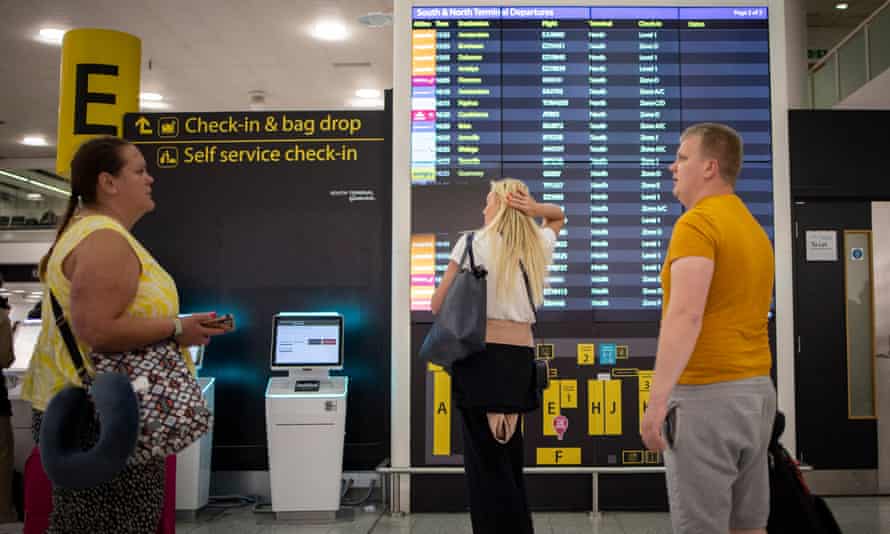Some of the thousands of people whose flights were cancelled or delayed during the half-term travel chaos have been told they will receive no compensation, leading to calls for a change to the way passengers are reimbursed ahead of what looks to be a chaotic summer for airlines.
Others have spoken of claims being lost and having to resubmit forms as many as seven times, while passengers caught up in earlier disruption said they have waited months for airlines to talk to them.
Consumer champions are calling for regulators to be given powers to fine airlines if they break compensation rules, fearing a repeat when the school summer holidays begin next month. Scheduled flight bookings for July are already above 2019 levels.
The beginning of June was the first time many people had taken a foreign holiday since the pandemic began, with about 2 million people travelling overseas. But staff shortages meant airlines and tour operators struggled to cope with demand.
Tui cancelled more than 180 flights, blaming “operational and supply chain issues”; British Airways cancelled 124 with several weeks’ notice and Wizz Air also dropped flights. EasyJet has cancelled more than 280 flights since 28 May and said it had told customers they could rebook, get a refund or “apply for compensation in line with regulations”.
But some easyJet passengers said they had been refused compensation. Ben Brabyn and his wife and two children were due to fly in the early afternoon on 27 May from Gatwick to Pisa in Italy for a family reunion that had originally been planned before the pandemic. After hours of delays, the flight was cancelled because it would not arrive in Pisa before a night-time curfew. EasyJet offered a rebooking for a flight several days later – after the reunion ended – so the Brabyns found a flight to Naples instead.
It meant money spent on parking at Gatwick, car hire in Pisa and accommodation was all wasted, with extra costs for last-minute plane tickets and car hire, leaving Brabyn about £1,500 out of pocket.
He assumed he would get a refund and £880 in compensation – £220 per person. But last week he received an email saying he was “ineligible”.
“I haven’t received a refund or any compensation,” Brabyn said. “There’s no way to challenge it. They didn’t give a reason. I had some sympathy before – it’s a difficult thing to manage. But not now.”
Other easyJet passengers said on social media that they had also been denied compensation too.
An easyJet spokesman apologised and said: “While we will of course be reimbursing the family in full for their alternative flight and other expenses incurred, as this flight was cancelled due to events beyond our control, in line with regulations compensation is not due on this occasion.”

Tui passengers said on social media that they had been denied compensation because the airline’s website said they were not listed, although some posted pictures of boarding passes online. Others said they had tried seven times to lodge a claim.
Tui apologised to customers and said a technical error on its flight manifest system had caused the problems which have now been fixed. Only a small number of passengers were affected, it said.
Some passengers have waited longer just for a response. Laurie O’Brien and her husband John Turville were due to fly to Buenos Aires on honeymoon on 3 April with British Airways, but their flight was cancelled when they were at Heathrow. They suffered a 13-hour delay on a replacement journey offered by BA.
Two months later, they have only received a generic email, O’Brien said. She believes they should receive £520 each for the cancellation and delay: “It’s unacceptable that we’ve received no apology or communication. It feels like they are hoping people will just forget about their claims.”
BA said it was sorry for the delay in responding to the couple and would contact them soon.
Lisa Webb, consumer law expert at Which?, said: “We’ve seen numerous examples of carriers failing to inform passengers of [their] rights and taking weeks to respond to claims – only to invite them to apply again because of technical errors. Consumers should not be made to jump through hoops to get the refunds and compensation they are legally owed.
“To prevent further abuse of passenger rights as the summer holiday season approaches, regulators must be given meaningful powers to hold rule-breaking carriers to account, starting with direct fining powers for the Civil Aviation Authority.”
Resolver, which helps customers raise complaints, said 2,949 people had already complained in June about cancelled flights – the monthly average last summer was less than 1,000. Resolver’s Martyn James said it was “an extraordinary number” and he had been flooded with enquiries.
“If a flight is cancelled then compensation applies so no one should be told that they don’t qualify unless there’s a specific reason that excludes a claim – the fault has to be that of the airline or foreseeable by them. So strike action is in, storm action is out. Air traffic control strike is out, understaffing is in.”
Passengers of most British airlines can escalate the matter to one of the CAA’s mediators, known as alternative dispute resolution (ADR).

In 2019, airlines and airports paid out £12.9m in compensation to exactly 18,000 of the 27,188 people who used ADR, according to quarterly CAA figures compiled by the Observer.
Complaints dropped during the pandemic when fewer people were flying, and in 2021 the number of successful claims also dropped significantly, with 2,550 claimants receiving a share of £1.7m, out of 9,627 claims. The CAA does not publish figures for complaints resolved or rejected by airlines and airports before ADR.
Grant Shapps, the transport secretary, has proposed changing the rules to a system similar to the train delay compensation scheme, which some analysts say would mean lower compensation payments for travellers, but this would apply only to internal UK flights.
Airports have quietened since half-term, but are likely to see more queues in July, with possible strike action by pilots in Scandinavia and airport staff in France. In the UK, airlines and airports are struggling to replace 30,000 workers laid off during the pandemic. Shapps blamed the industry for poor planning, but industry leaders say recruits are taking other jobs because of three-month delays in getting security clearance for new airport staff.
ForwardKeys, which tracks tickets issued for scheduled flights, said July bookings were already at 102% of 2019 levels, and 93% for August. Olivier Ponti, vice-president for insights, said: “The destination currently performing most strongly is Turkey, where bookings are 116% ahead of the equivalent moment in 2019. It is followed by Greece, 50% ahead, and India, 31% ahead.”
Abta, the travel industry body, said 58% of people had booked a holiday for the next 12 months, up from 44% in October last year.